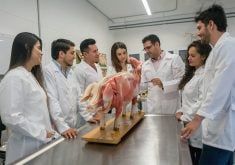CUT KNIFE, Sask. – They have millions of individuals to ride herd on, but the Pedersens have few problems with strays.
Their honeybee operation, situated in the rolling, treed hills of western Saskatchewan, doesn’t tolerate aggressive bees that tend to fly away to greener fields. Their losses are mainly due to age, weather and culling.
The bees support three brothers, their families and now, a new member.
Karen Pedersen is the fifth generation in her family to be a beekeeper, a lineage that can be traced back to Denmark from where her grandfather emigrated.
Read Also

Fuel rebate rule change will affect taxes and AgriStability
The federal government recently announced updates to the fuel rebates that farmers have been receiving since 2019-20.
She is now taking on another new role, as women’s president of the National Farmers Union. It’s a job that requires travel and many phone calls to keep in touch with the membership. But it is work she is familiar with, having grown up in the NFU. Her parents met at one of the group’s events and Pedersen and her brother started attending the week-long annual meetings when they got too old for day care.
She even remembers the first time she went to the microphone to speak at the NFU meeting. She was 11 and it was to oppose a constitutional change that would raise the age of youth membership. The motion failed.
Pedersen was youth president for two years in the mid-1990s.
“It changes your perspective about what you think you can do,” she said.
“Sitting on the NFU board, I clearly felt, ‘I don’t know enough. What am I doing here?’ So I asked a lot of questions. You realize the learning is part of the job. It’s not above your reach.”
Pedersen said she is on the board again because she wanted to help do the organization’s work.
“Also, I’m young. I plan on farming for a long time. I have a vision for farming.”
That vision is for Canadian families to continue farming profitably in small- and medium-sized enterprises so that communities and neighbours thrive.
Her decision to farm was a gradual one. When she finished high school, the first thing she wanted to do was leave. She travelled to Denmark, which she found crowded, and while getting a degree at the University of Saskatchewan decided she didn’t like the city either. Stints of work on the family farm and a realization that she was the next generation, because her brother and cousins had allergies or were too young, led her to become a permanent part of Pedersen Apiaries.
Beekeeping’s seasonal nature allows her time in the fall and winter to do NFU work.
Pedersen incorporated the business with her parents, Gil and Marcella, two uncles and an aunt. Each has their roles, whether running the honey collection and storage system, doing the books, supervising the field crew that looks after the hives, or managing queen bee sales.
This winter the family is carrying 720 hives, compared to 900 the year before. A cold March in 2002 killed some of the new bee brood and the summer drought affected honey production, with only 80 percent of the usual collected. Luckily, honey prices are at a record high.
The Pedersens place their hives in farmers’ fields in June within a 30 kilometre radius. The main bee-favouring crops in the area are sweet clover, alfalfa, borage and canola. The population per hive peaks at 65,000 during the summer, when worker bees are gathering pollen and nectar.
High school students are hired to help move the hives, collect the waxed honeycomb frames every couple of weeks and fill the tanks with liquid honey. The honey and wax are shipped by truck to a 150-member co-operative in Winnipeg.
Beekeeping’s capital requirements are not high, because minimal machinery or land is required, which helps young people enter the business. The future for honey is favourable now that many countries have banned Chinese supplies because of antibiotic contamination.
A disease and mite infestation that closed the borders to imported queen bees also has helped the Pedersens. Ten percent of their business is raising and selling queens to other beekeepers. Their stock has a reputation for gentleness. Each hive is evaluated for aggression.
“A queen gets two chances to be crabby,” said Gil Pedersen.
If the employees are stung more than twice at that hive, it is culled. He notes that Africanized bees, which have killed people and animals, could enter the Canadian industry if the American border is reopened to imported bees. Their apiary is one of six in Canada that is evaluating a strain of Siberian honeybee that appears resistant to the varroa and tracheal mites whose presence closed the border.
A change that could be coming for the business is foreign migrant labour, since it is getting more difficult to find enough students to work each summer.
Another issue is genetically modified crops. Already the co-op has lost honey sales in Europe, especially Germany.
“You can’t isolate the bees from GM canola,” Pedersen said.
When asked her view of agriculture in 10 years time, she said she sees fewer farmers and more isolation. She said the bigger-is-better philosophy is a cycle that has happened before, such as Soviet commune farms, plantations in the American south and European feudalism in the Dark Ages.
“We’re all recreating history. I’d rather be repeating good history.”
For further information, please visit www.producer.com and click on Links in the News.














